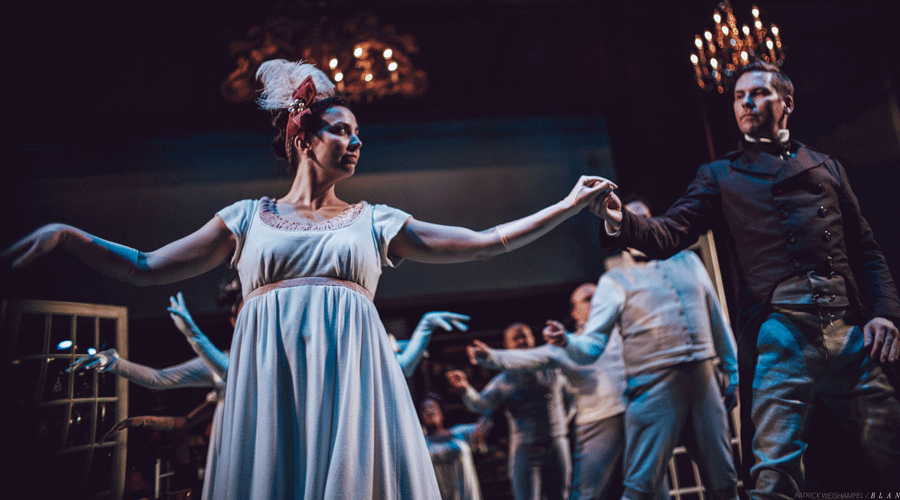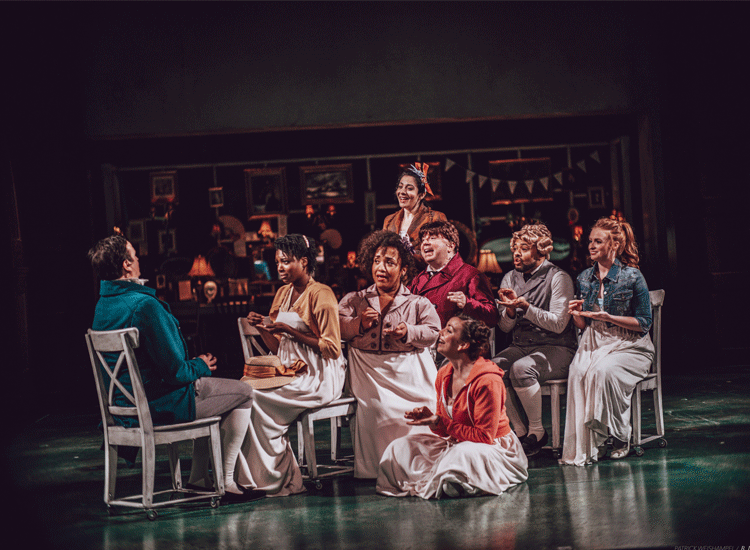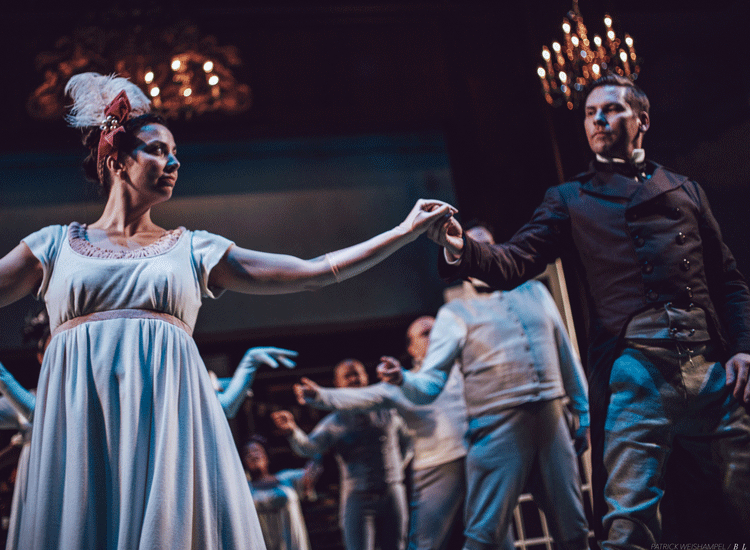The World of "Sense & Sensibility"
Why Jane? Why Now?
Since the 1940s, full-length film productions of Jane Austen’s novels have been turned out at a steady rate of three to seven per decade. These days, Austen “mania” continues to thrive, from Hollywood features inspired by her life and works, to Jane’s image featured on the cover of Newsweek.
Her novels and books about her novels crowd the bestseller lists. Two hundred years after the publication of Pride and Prejudice, Jane Austen still has enormous appeal for contemporary readers and viewers. What accounts for the continuing popularity of Jane Austen? Why Jane, and why now?
At first glance — particularly for most high school students — Austen’s popularity is hard to fathom. Austen wrote about the problems and pressures of 19th century courtship and marriage. Action and adventure are limited to a walk in a rainstorm or a ride in an open carriage without a chaperone; powerful feelings and desires are expressed indirectly, if at all; conversation is a high art, flavored with ironic wit and the discussion of weather. Her characters’ behavior and life choices are dictated by standards and values that can seem utterly foreign in a world as rapidly changing as our own.
Perhaps modern readers and viewers continue to be drawn to Austen’s work because of the very limitations that may make us wary at first. The physical and social landscape within her work is restricted, but the field of themes, emotions, and even desires she explores there is deep and broad. How, her novels ask, does a person do the hard work of creating a good, happy, balanced life?
Finally, all the novels ask a question that resonates today as powerfully as it did in Austen’s time: What chance do the needs of the heart and mind have in a world dominated by money? The world of Jane Austen’s novels may be small, but it is not simple.
Austen’s other great appeal is that spending time in her world is fun. Her world is different from ours, and the films and novels transport us there. We can travel through Regency England (approximately 1800–1820) as tourists, free to enjoy what is glittering and entertaining. Thanks to her deft sense of humor, we delight in her characters, with all their faults. We return home, remembering the pleasures of her world and think about how that world reflects upon our own, with its sharp differences and its subtle and surprising similarities.
For a deeper dive into Jane Austen's appeal, explore the Masterpiece collection of Jane Austen films.
Life in Regency England
In order to understand the way characters behave in Jane Austen’s world, one needs to familiarize themselves with some of the realities and assumptions that governed behavior in early 19th century England.
Austen’s novels concern themselves with the landed gentry in England whose social significance derived primarily from their inherited property, the history of their families, and their embodiment of idealized morals and manners. This social class, which was lower in prestige than the nobility or aristocracy, has no exact parallel in modern American society.
Crucial for Austen personally, as well as for her characters, was the fact that, for both legal and customary reasons, wealth was not shared equally among all the members of gentry families. Women were often obliged to seek financial security through prosperous marriages, even at the cost of their own happiness.
Austen was especially interested in the behavior of those characters who, for reasons of birth or chance, find themselves on the margins of the gentry, either clinging to former respectability or hoping to elevate themselves into this social class. Social conventions governed every aspect of gentry life, from everyday courtesies to the professions considered suitable for men (only being a governess or teacher was considered marginally suitable for a gentlewoman).
Glossary for 19th Century Society
Wealth: Inherited wealth is superior to wealth earned through business or a profession.
Social class: You should remain in the social class you are born into, only socialize with those of the same class, but treat those “below” you with respect, not contempt.
Gentry: A term reserved for a social class of person in Jane's time. These individuals made their incomes from renting the lands they owned.
Courtship and marriage: Unmarried men and women must always be chaperoned. Courtship is formal and physical contact is limited. Marriage is an economic arrangement to preserve or increase wealth in families.
Gender roles: Men’s and women’s roles are strictly proscribed along gender lines, from education and work to property rights and speech.
Parents and family: Parents demand and receive deference and respect. They have a strong voice in the choice of marriage partners.
Assembly Room: A place where people gathered for dances, card games, conversations and to "be seen".
Chaise: A two-wheeled, horse-drawn carriage that could carry up to four passengers and was driven by a servant. The top was convertible and could drop down for fine weather.
Commerce: A popular card game in the 18th and 19th centuries in which players swap cards turned face up in an effort to improve their hands. Also called whiskey poker.
Endowment: Typically references funds structured in such a way as to consistently provide an income to a given individual, family or organization.
Introductions: A new person to a party or gathering was always introduced by someone who knew him/her. New acquaintances would curtsey or bow, while handshaking was reserved for true friends. Self-introductions were allowed by people of higher rank. People of lower rank had to wait for an introduction and remain silent in mixed-rank company until such an introduction was made. Once introduced to someone, it was expected to forevermore acknowledge that person with a bow, curtsey, or nod.
Milita: An army composed of ordinary citizens rather than professional soldiers. In Jane Austen's time militias were called on to protect the homeland from overseas invasion if needed.
Primogeniture: The legal right of the eldest child (son) to inherit the entire estate of his parents. Subsequent sons had to make a living by choosing an occupation fitting for a gentlman (clergy, solicitor/lawyer, etc).
Twelvemonth: In Jane's novels, the term covers a typical 12-calendar month.
Curious to explore more terms from Jane Austen's world? Further reading available here.
The History of England According to Jane Austen
When Jane Austen was only 15, she wrote a satirical piece for her older sister and lifelong companion, Cassandra. It's an energetic, farcical reworking of eighteenth-century historical narratives by Hume, Robertson and (above all) Goldsmith.The full title was The History of England, from the reign of Henry IV to the death of Charles I, by a partial, prejudiced and ignorant historian. There will be very few Dates in this History.
Her first two chapters read as follows.
“Henry IV ascended to the throne of England much to his own satisfaction in the year 1399, after having prevailed on his cousin and predecessor Richard II to resign it to him, and to retire for the rest of his life to Pomfret Castle, where he happened to be murdered. It is to be supposed that Henry was married, since he had certainly four sons, but it is not in my power to inform the reader who was his wife. Be that as it may, he did not live forever, but falling ill, his son the Prince of Wales came and took away the crown; whereupon the King made a long speech, for which I must refer the reader to Shakespeare’s plays, and the Prince made a still longer. Things having been thus settled with them, the King died, and was succeeded by his son Henry, who had previously beat Sir William Gascoigne (The Lord Chief Justice).
The Prince after he succeeded to the throne grew quite reformed and amiable, forsaking all his dissipated companions and never thrashing Sir William again. During his reign Lord Cobham was burnt alive, but I forget what for. His majesty then turned his thoughts to France, where he went and fought the famous Battle of Agincourt. He afterwards married the King’s daughter Catherine, a very agreeable woman by Shakespeare’s account. In spite of all this however, he died.”
Portland Center Stage is committed to identifying & interrupting instances of racism & all forms of oppression, through the principles of inclusion, diversity, equity, & accessibility (IDEA).

















